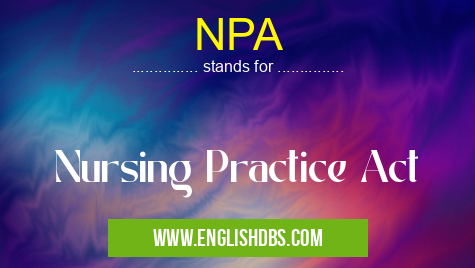What does NPA mean in NURSING
NPA Meaning in Medical

NPA meaning in Nursing in Medical
NPA mostly used in an acronym Nursing in Category Medical that means Nursing Practice Act
Shorthand: NPA,
Full Form: Nursing Practice Act
For more information of "Nursing Practice Act", see the section below.
NPA stands for Nursing Practice Act. It is a set of laws and regulations that govern the practice of nursing in a particular jurisdiction. NPAs vary from state to state, but they generally outline the scope of practice for nurses, the requirements for licensure, and the ethical and legal responsibilities of nurses.
Scope of Practice
NPAs define the activities that nurses are authorized to perform. This includes tasks such as:
- Assessing patients' health conditions
- Developing and implementing nursing care plans
- Administering medications
- Providing wound care
- Teaching patients about their health
Licensure Requirements
NPAs establish the requirements that nurses must meet in order to obtain a license to practice. These requirements typically include:
- Graduating from an accredited nursing program
- Passing a national licensing exam
- Completing continuing education hours
Ethical and Legal Responsibilities
NPAs outline the ethical and legal responsibilities of nurses. These responsibilities include:
- Maintaining patient confidentiality
- Providing competent care
- Advocating for patients' rights
- Reporting suspected abuse or neglect
Essential Questions and Answers on Nursing Practice Act in "MEDICAL»NURSING"
What is the Nursing Practice Act (NPA)?
The NPA is a law that governs the practice of nursing in each state. It outlines the scope of practice for nurses, including their duties, responsibilities, and qualifications.
What are the main provisions of the NPA?
The NPA typically includes provisions related to nurse licensure, education, continuing education, ethical conduct, and disciplinary procedures.
How does the NPA differ from state to state?
While NPAs share common principles, they can vary from state to state in terms of specific regulations and requirements. For example, some states have more stringent continuing education requirements than others.
What are the consequences of violating the NPA?
Violating the NPA can result in disciplinary action from the state nursing board, including suspension or revocation of license.
How can nurses stay up-to-date on NPA changes?
Nurses should regularly check with their state nursing board for updates and changes to the NPA. They can also subscribe to professional nursing journals and attend continuing education programs.
What is the role of the nursing board in enforcing the NPA?
The nursing board is responsible for investigating complaints against nurses, conducting disciplinary hearings, and enforcing the NPA.
How can the NPA protect patients?
The NPA helps to ensure that nurses are qualified, competent, and ethical. It establishes clear standards of practice and provides a framework for disciplinary action against nurses who violate those standards.
Final Words: NPAs are essential for ensuring the safe and effective practice of nursing. They provide a framework for nurses to follow and help to protect both patients and nurses. By understanding the NPA, nurses can ensure that they are practicing within their scope of practice and meeting their legal and ethical responsibilities.
NPA also stands for: |
|
| All stands for NPA |
